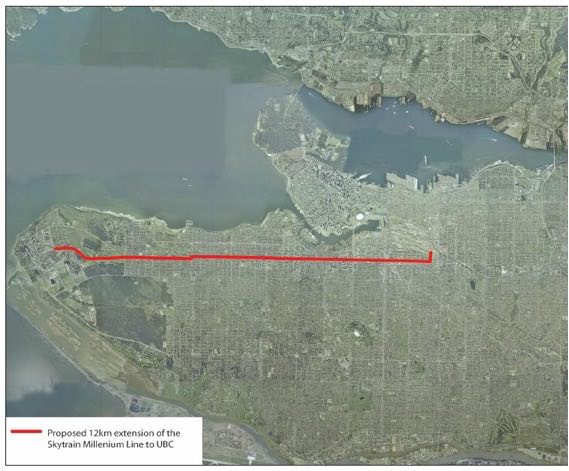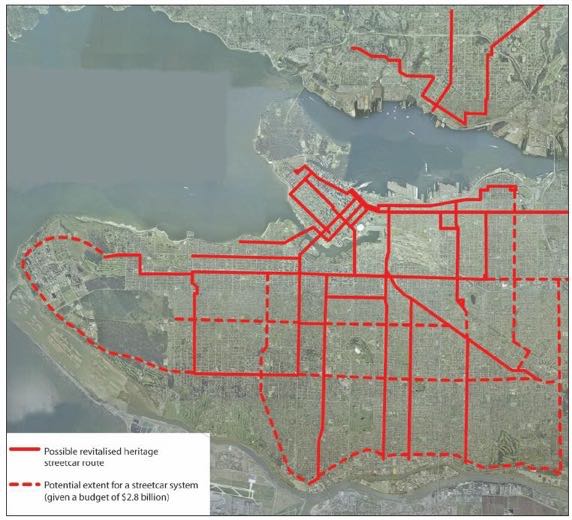The Coalition of Vancouver Neighbourhoods has sent the following letter to Prime Minister Justin Trudeau, to all the local Vancouver federal MPs, and to key ministers responsible for federal infrastructure and funding. This letter is also available for download as a PDF: CVN Letter to MPs-Nov.30-2015.pdf
November 30, 2015
Federal Members of Parliament, Vancouver Ridings
Re: Federal Assistance for Vancouver Transit and Housing
Dear Vancouver Member of Parliament,
Congratulations on your recent election as a Member of Parliament for the Vancouver area. We look forward to working with you to represent the interests of Vancouver neighbourhoods in Ottawa.
What we are Requesting
We note that the Federal Liberal Party platform included providing infrastructure funding for transit and housing. We heartily applaud these funding initiatives, which we believe are long overdue. However, we have serious concerns about how these funds may be implemented in the City of Vancouver. We therefore are asking that the federal government require conditions be met to address these concerns prior to approving federal infrastructure funding.
Transit and Housing Infrastructure
We are requesting that transit funding be conditional on citizen support for the transit and related land use plans. This also applies to implementation of housing infrastructure funding.
We ask that the new federal Liberal government:
- require a full and transparent public process in the City of Vancouver to determine the most publicly supported option for rapid transit on Broadway before federal funding for transit is provided;
- support more affordable transit options that provide broad distribution of benefits;
- not use Public Private Partnership (P3) funding models;
- not use development to fund transit;
- ensure that land use patterns around transit, and for new social housing, are an appropriate fit and compatible with our community supported plans; and
- extend co-op housing operating agreements that are now expiring.
Additional Requests for Federal Programs to Address Affordability
- reinstate the RRAP program in which CMHC gave grants to low income earners for upgrades to older housing for health, safety and energy efficiency;
- provide federal tax incentives for rental housing and for the retention of heritage homes; and
- use federal powers to make housing in Vancouver more affordable for local residents through protection from an unregulated global housing market.
1) TRANSIT:
Negative impacts of transit tied to high density transit-oriented development
The Metro Vancouver Region’s designation of major transit infrastructure routes as Frequent Transit Development Areas (FTDA) encourages, requires and supports extremely high density development. This is the city and region’s proposed direction for the area referred to as the Broadway Corridor from Nanaimo/Commercial Drive to UBC, 4th Avenue to 16th Avenue. While this plan would involve a radical transformation of the Broadway Corridor and affected neighbourhoods, public consultation has been minimal with community input not reflected in the plan.
The proposed first phase of development of the Corridor is identified to be a subway from Vancouver Community College to Arbutus Street. If the first phase is approved, the city has indicated it would be also looking at land use designations west of Arbutus to UBC in anticipation of a phase two extension of a subway to UBC. This will have significant impacts on neighbourhoods in and surrounding the Broadway Corridor without their support.
Under this scheme for the Broadway Corridor, the City’s Transportation 2040 policies and the KPMG report propose that development could be similar to that of the Cambie Corridor, on the Oakridge Mall scale (redevelopment approval added 11 towers up to 45 storeys in height) as a model for sites such as the Jericho Lands. This scheme would not be an appropriate fit for our neighbourhoods and would destroy its existing character and not provide the kinds of medium density family-oriented housing that are so desperately needed in our city.
Worse yet is the very real possibility that neighbourhoods could be transformed by transit-oriented development and densification well in advance of transit infrastructure that may not be provided for decades, if ever. Meanwhile, intense levels of new development would add further congestion to the already severe impacts of UBC commuter traffic.
Amenities Starved for Transit Funds
Problems arise if subway funding is tied to a Public Private Partnership (P3) model, or if development is used to fund transit. These funding models would divert Community Amenity Contributions (CACs) paid by developers into funds that would pay for transit rather than for amenities for the community and its increased population. This is an unacceptable form of downloading the cost of transit onto cities and communities.
The Future of Transit
It is by no means certain that, in the long term, future transit systems will be dominated by large scale high cost projects. It is clear from the recent transit plebiscite that the public is fed up with continually paying for high cost transit, and is demanding more accountability.
Proponents of a Broadway Corridor subway would like to boil the choice of options down to efficiency and “megaproject” economic stimulus. However, the broader implications of competing public transit visions for Vancouver and its neighbourhoods are vastly more complicated and significant.
There are other options to promoting a nodal pattern of high-rise development through high-cost underground rapid transit on a single corridor. Others advocate for a high-capacity, at-grade transit network that is more evenly distributed and reinforces a pattern and scale of urban development that is more affordable, livable, socially productive and supports businesses on a broader city-wide scale.
Studies have shown that a more evenly distributed transit network is also more cost effective (see below results of a UBC- based study). These studies indicate that it is also vastly more sustainable from an environmental perspective to replace existing fossil- fuelled diesel buses with a combination of higher-capacity, zero-emission electric streetcars and articulated trolleybuses. The existing transit grid could have more frequent transit and expanded routes throughout the city and on key routes of heavy demand.
For the price of this….

We can have this…
Equivalent electric streetcar network deliverable for same cost of proposed Broadway Corridor subway (Condon, et al, 2008, The case for the tram; learning from Portland, Sustainability by Design – An examination of alternatives to an underground extension of the Millennium Line to UBC, Foundational Research Bulletin, No. 6.)
How This Affects Us
There is a real danger that our neighbourhoods, and in particular larger sites such as the Jericho Lands, could be planned and built based on an outdated approach and faulty assumptions. Many informed sources suggest that a nodal based approach to transit, based on transit megaprojects and high rise development, is probably not the way of the future as some have suggested.
The Federal Liberal Party platform said only that they would support “rapid” transit on Broadway, but rapid transit can take a variety of forms other than a subway. Rapid transit could instead be streetcars or rapid electric trolley buses, or other combinations of grade level transit at a fraction of the cost as noted in the example above.
2) HOUSING:
Social and Co-op Housing
The co-op housing projects built under CMHC programs were covered by operating agreements that provided federal funding supplements. Many of the operating agreements are expiring and need to be renewed to ensure ongoing public ownership and subsidized rents for the most vulnerable in our society. We understand that the new federal government is now considering these extensions and we strongly support this.
New infrastructure funding should be provided for new social and co-op housing projects subject to appropriate design controls to ensure that the size, scale and design elements are consistent and compatible with our local area plans and are community supported.
Reinstate the RRAP Program – In addition to funding for social or co-op housing , the federal government could reinstate the RRAP program in which CMHC gave grants to low income earners for upgrades to older housing for health, safety and energy efficiency.
Federal Tax Policies as Incentives for Rentals and Heritage Retention
Tax advantages are needed to encourage long-term ownership of lower-rent buildings and incentives for retention and upgrade of solid older buildings. This helps to reduce inflationary pressure on rents and loss of more affordable older rental stock.
As an incentive to retain heritage buildings only, capital gains tax laws should be amended, for up to two secondary suites on one house lot to be allowed to still qualify for principal residence exemption from capital gains tax as long as they are non-strata family or rental and the owner occupies the main unit. Perhaps long term owners could be allowed to also occupy one of the secondary units. This provides incentives for heritage retention while also encouraging more rental units and providing mortgage helpers to assist home ownership.
Protection from Global Housing Market – The purchase of housing is largely unaffordable for local residents in Vancouver. Action is needed to protect communities from an unregulated global housing market in which local residents are at an unfair disadvantage since local real estate is becoming disconnected from the local economy and work force. We ask the federal government to correct and better enforce tax and other regulations, as well as to create additional preventative measures to protect the local housing market.
In Conclusion, we hope you will deliver this message to the Prime Minister and your fellow MPs and ensure our communities’ interests are represented. We would like to meet with you to discuss plans for transit, land use and housing affordability in Vancouver. Please confirm receipt of this letter and let us know when would be a good time to meet.
Sincerely,
Larry Benge, Co-Chair
Dorothy Barkley, Co-Chair
On behalf of the Coalition of Vancouver Neighbourhoods
Member Groups of the Coalition of Vancouver Neighbourhoods
- Arbutus Ridge Community Association
- Arbutus Ridge/ Kerrisdale/ Shaughnessy Visions
- Cedar Cottage Area Neighbours
- Citygate Intertower Group
- Community Association of New Yaletown
- Crosstown Residents Association
- Downtown Eastside Neighbourhood Council
- Dunbar Residents Association
- False Creek Residents Association
- Grandview Woodland Area Council
- Granville Burrard Residents & Business Association
- Kitsilano-Arbutus Residents Association
- Kits Point Residents Association
- Marpole Residents Coalition
- Norquay Residents
- NW Point Grey Home Owners Association
- Oakridge Langara Area Residents
- Residents Association Mount Pleasant
- Riley Park/South Cambie Visions
- Shaughnessy Heights Property Owners Association
- Strathcona Residents Association
- Upper Kitsilano Residents Association
- West End Neighbours
- West Kitsilano Residents Association
- West Point Grey Residents Association
Link to Tyee: UBC Professor Patrick Condon http://thetyee.ca/Opinion/2016/01/25/Bad-Transit-Projects/
Link to Common Ground: Elizabeth Murphy http://commonground.ca/2015/11/federal-funding-should-support-an-accountable-transit-plan/






